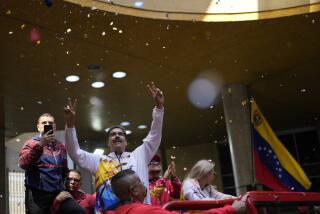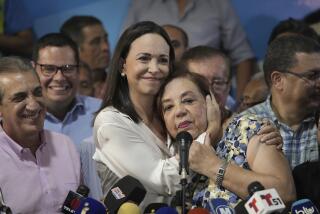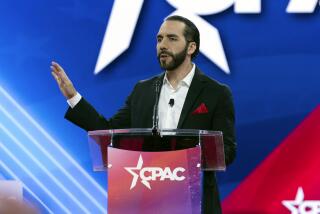Venezuela’s Henrique Capriles will face Hugo Chavez in race
Venezuelan presidential candidate Henrique Capriles easily won Sunday’s primary vote to become the single challenger against President Hugo Chavez, setting the stage for an intense campaign season leading to the general election in October.
Capriles, the governor of Miranda state, was declared the winner late Sunday with about 95% of the votes counted, officials said. Zulia state Gov. Pablo Perez came in a distant second.
Speaking to thousands of supporters in east Caracas on Sunday night, Capriles thanked voters who “overcame obstructions and intimidation” to vote for him.
“This is a country in crisis,” the 39-year-old Capriles said. “If there was one message people all across Venezuela gave me, it was they are exhausted by confrontation and division. I’ll be a president for Venezuelans of all colors, not just red ones,” referring to the red shirts worn by many Chavez supporters.
Capriles was joined at his victory speech by his four opponents in the primary race, all of whom pledged to support him in the presidential race.
Capriles’ success, analysts say, has largely come from his promise to retain social programs that Chavez instituted, while pledging to run a more efficient, less divisive, corruption-free government and reduce crime.
Chavez, 57, has already been named the candidate of his socialist PSUV party and is seeking another six-year term.
In his 13 years in office, Chavez has changed the country profoundly by putting the problems of the poor at the front and center of his political agenda and giving them benefits from Venezuela’s oil riches.
“He made dealing with poverty part of the national discourse and social themes more important,” said political science professor Jose Vicente Carrasquero.
Chavez has cut Venezuela’s extreme poverty rate in half, to 10% of the population from 20%. He’s done that partly by doubling the public payroll to 2.6 million workers from 1.3 million in 1999, said economist Jose Manuel Puente. Through his “missions,” as his welfare programs are called, he funnels as much as $15 billion annually to one-quarter of the adult population.
But even many die-hard Chavez supporters would say there has been a dark side to his long tenure in office. Homicides have doubled over the last decade, and many Venezuelans resent his foreign aid to Cuba and other countries. Despite the immense oil windfall over the last decade, housing and other social infrastructure is inadequate given the nation’s population growth. The stagnant economy is plagued with inflation, scarcities and high unemployment.
“I voted for him in 1998 because I believed him when he said he promised to make life in Venezuela like a golden chalice,” said John Diaz, 63, a retired government employee who was standing in line in central Caracas to vote for Capriles. “But the money has been wasted or spent on foreign adventures so he could be the region’s field marshal. I made a mistake.”
“We’re not living, we’re surviving these conditions of inflation, insecurity, corruption and no opportunity for our youth,” said 52-year old homemaker Ligia Martinez, also a former Chavez backer who said she planned to vote for Capriles. “I can’t stand his way of talking with hatred and insults for anyone who disagrees with him. I can’t listen anymore.”
Another Chavez vulnerability has to do with his health. Although he appears to have regained some of the dynamism he lost after his June diagnosis of cancer and subsequent chemotherapy rounds, no one really knows how advanced his cancer is. The question of how long he will survive and who would replace him in the event that he died while in office has become an issue with voters.
Not only does the opposition think it can leverage the discontent and uncertainty, it now knows there is an electoral path to victory based on unity, said advisor Marino Gonzalez. By presenting a common slate of candidates, the opposition won a third of assembly seats and governorships and a plurality of votes in 2010 state and local elections.
That new path was marked out in 2009 when nearly all opposition parties and candidates signed the so-called Democratic Unity agreement that was modeled on the pact signed by Chilean opposition parties to beat dictator Augusto Pinochet at the polls in 1989. The Venezuelan agreement came into being a month after Chavez won a referendum in February 2009 giving him the right to run for reelection for an unlimited number of terms.
“That made us see we were looking at a ‘Forever Chavez’ government and that without unity it would be impossible to beat him,” Gonzalez said.
Although other opposition candidates were far more critical of Chavez during the campaign, Capriles won the race Sunday in part by promising to out-Chavez Chavez: by retaining the social welfare programs that now deliver cut-rate groceries, free medical care, cash stipends to adults undergoing job training and payments to families of up to $100 per child per month.
Capriles said he would model his approach after former Brazilian President Luiz Inacio Lula da Silva, who in his two terms in office used welfare programs to reduce poverty, boost consumption, increase education coverage and raise living standards.
“The Brazilian model is an example,” Capriles said this month, “of how the private and public sectors can work toward a single objective, which is a nation with less inequality, in which anyone in extreme poverty who wants to escape it can do so.”
All candidates have made political hay with Venezuela’s runaway violent crime, perhaps the main reason pollster Alfredo Keller thinks Chavez is vulnerable in October. The headlines are filled everyday with the latest outrage, which last week was the news of the killing of the Monagas governor’s bodyguard in the gym where the governor was working out.
Homicides last year totaled 19,366, more than double the 8,022 killings in 2000. The prevalence of arms in Venezuelan society was brought home in a notorious photo taken at a Jan. 23 public function that showed a child member of the so-called Piedritas militia toting an AK-47 machine gun.
Still, no one in the opposition camp underestimates Chavez as less than a formidable electoral foe. He has a rock-solid support base, Carrasquero said.
To divert attention from domestic woes, Chavez added three new “missions” or welfare programs last year and has ramped up his anti-U.S. rhetoric, saying any opposition candidate would be a tool of the “empire.” By prohibiting members of his PSUV party to vote in the primaries and implying that a new government would usher in chaos, Chavez has also tried to capitalize on fear of change, Keller said.
“We have to sell inclusion because people are tired of conflict, convince them there is no reason to be afraid,” Gonzalez said. “Or we aren’t going to win.”
Kraul and Mogollon are special correspondents.
More to Read
Start your day right
Sign up for Essential California for news, features and recommendations from the L.A. Times and beyond in your inbox six days a week.
You may occasionally receive promotional content from the Los Angeles Times.






